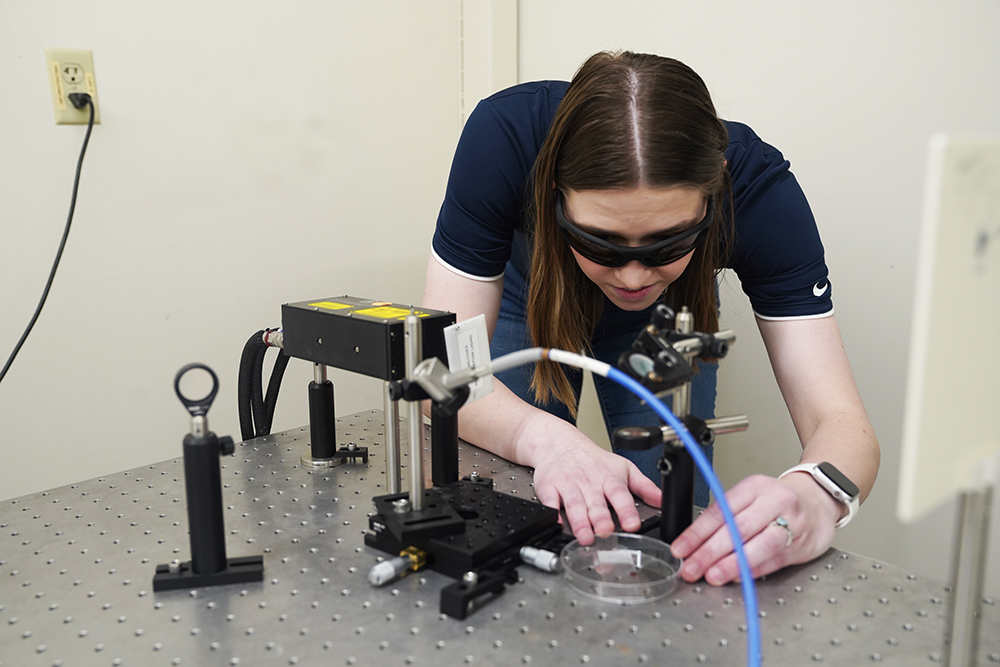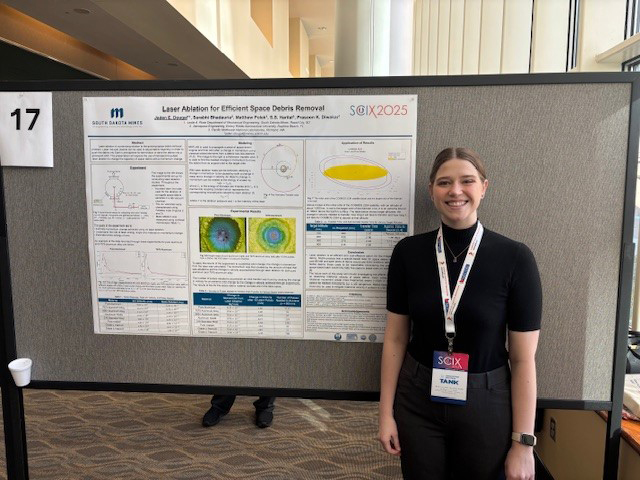Shooting for the Stars: Mines Student Wins National Award for Groundbreaking Space Debris Research

At just 9 years old, Jaden Dougal’s passion for aerospace was ignited during a Girl Scout trip to the Johnson Space Center.
“I was hooked on everything aerospace and knew I had to be part of it,” she said.
That dream brought the Texas native to South Dakota Mines, where she built a solid foundation in mechanical engineering with a focus on aerospace. By her sophomore year, she was already conducting research, using laser ablation to efficiently tackle space debris.
That research recently earned second place Federation of Analytical Chemistry and
Spectroscopy Societies (FACSS) SCIX national conference. Dougal was selected from
among students from all over the world, representing various fields of spectroscopy.
“This award means so much to receive,” Dougal said. “My research is very niche, focusing on a topic that most people do not, as the aerospace industry has not prioritized this issue. Receiving this award brings more awareness to this problem, and I hope that awareness will lead to more solutions like the one I am researching.”
Dougal’s research explores how laser ablation, a process that uses powerful laser pulses to alter an object's trajectory, can be applied to remove space debris.
By testing both nanosecond and femtosecond pulsed lasers, the study aims to determine how laser-induced mass loss and momentum changes can safely guide debris to re-enter Earth’s atmosphere or move to graveyard orbits. The experimental results will refine existing orbital models, improving predictions of how momentum shifts affect debris movement, and could also advance methods for controlling debris rotation and enhancing real-time targeting of objects in space.
She began her research during her sophomore year at Mines under Prasoon Diwaker, Ph.D., associate professor in the Leslie A. Rose Department of Mechanical Engineering.
“Jaden is an exceptional researcher whose passion is directly focused on solving challenging space-related problems, specifically the critical issue of space debris,” Diwaker said. “Her project is innovative, combining the physics of laser ablation with orbital mechanics to potentially address this global concern.”
Her work is a strong collaboration with leading experts, including Surabhi Bhadauria, Ph.D., from Embry-Riddle Aeronautical University, S.S. Harilal, Ph.D., from Pacific Northwest National Laboratory, and Mines Professor Emeritus Donald Teets, D.A.
“Jaden has motivated other undergraduate students, such as Hannah Duncan and Krista Burkman from the mechanical engineering department, to carry this work forward at South Dakota Mines in the coming years,” Diwaker said.
Dougal continued her study throughout her junior and senior years, conducting experiments with the help of the Pacific Northwest National Laboratories and Embry-Riddle University. In May 2025, she graduated with her bachelor’s degree in mechanical engineering with minors in aerospace engineering and systems engineering. Now a Mines graduate student, she is continuing her research on laser ablation for her master’s thesis.
She plans to graduate with her master’s degree in May 2026 with the hope of working in industry and continuing the efforts to solve the space debris problem.
Dougal’s journey, from childhood curiosity to nationally recognized research, is changing the way people think about space debris and creating a safer, cleaner and more sustainable exploration of space.